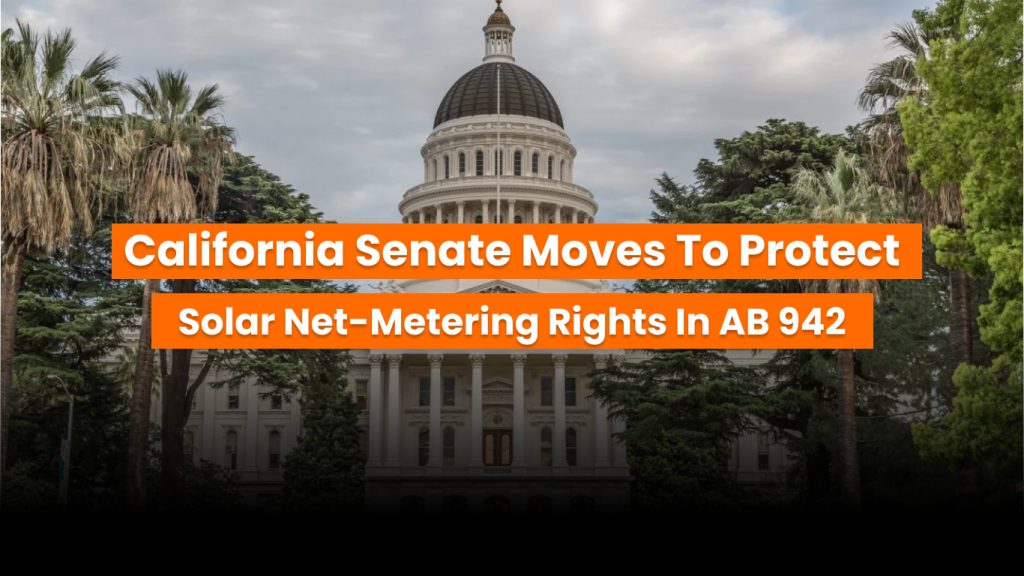Net-metering : The California Senate Energy, Utilities and Communications Committee voted to amend Assembly Bill 942, preserving net‑metering agreements when a solar-equipped home is sold or transferred. According to Solar Power World, this marks a significant victory for rooftop solar advocates and long-term system owners.
Committee Greenlights Amendments to Preserve net‑metering Terms
On July 15, the committee, led by Chair Josh Becker, cast a 9-to-4 vote to remove provisions that would have forced solar homeowners off their net‑metering agreements at the time of property transfer. The amended content ensures legacy solar contracts stay in place following a sale, safeguarding predictable electricity savings for homeowners. (Source: pv magazine USA)
The original text of AB 942 would have shifted solar-losing homeowners onto less favorable NEM 3.0 rates—which pay approximately 80 percent less for surplus energy—upon sale or after ten years. The Senate committee strikeout preserved the existing contracts and eliminated language that had threatened cap‑and‑trade climate credits for solar customers. (Source: pv magazine USA)
Stakeholder Responses and Industry Praise
Brad Heavner, executive director of the California Solar & Storage Association, expressed appreciation: “Solar supporters in California extend our heartfelt thanks to the Senate Energy Committee and Chairman Becker for their leadership in amending AB 942 to protect the integrity of net‑metering contracts.” (Source: Solar Builder Magazine)
Heavner emphasized the amendment as a win for households and businesses that invested in solar based on state-guaranteed net‑metering terms tied to property transfers. (Source: Solar Builder Magazine)
JD Dillon, chief marketing officer at Tigo Energy, noted the threatened language would have “undermined consumer confidence, devalued home solar investments, and stalled progress toward California’s clean energy goals.” (Source: pv magazine USA)
Broad Coalition Fights Termination of Contracts
AB 942 had drawn strong opposition from over 100 advocacy groups and key stakeholders, including real estate professionals and solar industry leaders. Critics warned against retroactive policy changes that could disrupt existing contracts and real estate transactions. (Source: Solar Builder Magazine)
Fox Swim of Aurora Solar commented the Senate vote sent “a very clear message to the residential solar industry from the state of California,” warning that altering multi-year incentives risks destabilizing voter and investor trust. (Source: Solar Builder Magazine)
Ongoing Challenges Remain
Despite removing the contract-breaking provisions, the revised AB 942 will still face scrutiny. The amended bill retains clauses that eliminate cap‑and‑trade climate credits for homeowners with under $300 in annual electricity usage. This may affect low-usage households or those with minimal grid consumption. (Source: pv magazine USA)
Additionally, net‑metering will still default to NEM 3.0 if a house is sold, potentially reducing the economic value associated with rooftop solar systems. (Source: pv magazine USA)
Heavner characterized these elements as challenging and warned, “We’ll continue to monitor this closely to ensure solar users’ rights are protected.” (Source: Solar Builder Magazine)
Broader Implications for California and Beyond
The elimination of contract-breaking language is a considerable win for solar advocates in California. Legal experts have suggested blanket policy changes on solar aren’t enforceable, and retroactive changes may result in lawsuits.
California’s previous allowance of 20-year net‑metering terms contributed to a robust rooftop solar market that now accounts for nearly 2 million residential systems. The amended legislation ensures these substantial investments remain valid even during property transfers. (Source: pv magazine USA)
Next Steps for AB 942
The amended bill will now proceed to the Assembly Appropriations Committee. With support from major stakeholders and bipartisan momentum in both chambers, the bill appears poised to advance further. (Source: SFGATE)
As the legislation advances, advocates are calling for the removal of remaining challenging provisions and an expansion of consumer protections. The outcome may set a precedent for how other states reconcile legacy solar agreements amidst evolving energy markets.
Summary
California’s Senate committee vote effectively preserves the rights of solar homeowners to retain net‑metering agreements upon home sales. While some clauses remain under debate, the key takeaway is this: past investment decisions won’t be undercut. Sun-powered households in California can breathe easier as AB 942 moves forward—with the primary fight focused on protecting existing agreements.




